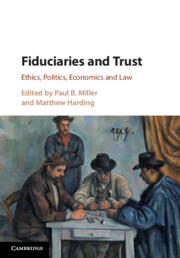Book contents
- Fiduciaries and Trust
- Fiduciaries and Trust
- Copyright page
- Dedication
- Contents
- Contributors
- Acknowledgements
- Introduction
- Part I Personal Trust and Fiduciary Relationships
- Part II Personal Trust and Fiduciary Duties
- Part III Political Trust and Fiduciary Government
- 9 Trust and Authority
- 10 The Fiduciary Crown
- 11 Political (Dis)Trust and Fiduciary Government
- 12 Trust, Distrust and the Rule of Law
- Part IV Trust and Fiduciary Law in Context
- Index
9 - Trust and Authority
from Part III - Political Trust and Fiduciary Government
Published online by Cambridge University Press: 13 March 2020
- Fiduciaries and Trust
- Fiduciaries and Trust
- Copyright page
- Dedication
- Contents
- Contributors
- Acknowledgements
- Introduction
- Part I Personal Trust and Fiduciary Relationships
- Part II Personal Trust and Fiduciary Duties
- Part III Political Trust and Fiduciary Government
- 9 Trust and Authority
- 10 The Fiduciary Crown
- 11 Political (Dis)Trust and Fiduciary Government
- 12 Trust, Distrust and the Rule of Law
- Part IV Trust and Fiduciary Law in Context
- Index
Summary
Some judges and scholars hold that within legal limits and across legal frameworks, there is just a legal void, a domain in which law is absent. I challenge the legal void thesis, arguing that law operates within the spaces law creates. Law governs the interstitial spaces that exist within legal limits and across frameworks through its possession and assertion of legitimate authority. Importantly, its spatially seamless assertion of legitimate authority relies on a relationship of mutual trust between law-giver and legal subject. The argument begins by setting out the distinction between a decision-making entity’s authorization (ie, the process that led to it having authority) and its authority per se (ie, the nature of its legal power). The next section builds on the authorization/authority distinction and introduces the idea of mutual trust through the writings of Thomas Hobbes. Hobbes persistently uses the language of trust to characterize the position of the sovereign and other public officials. The second half of the paper sketches the conception of trust on which I rely, and explains how mutual trust informs law’s authority such that law can be understood to pervade the spaces it creates for the liberty of its subjects and officials
- Type
- Chapter
- Information
- Fiduciaries and TrustEthics, Politics, Economics and Law, pp. 175 - 197Publisher: Cambridge University PressPrint publication year: 2020



